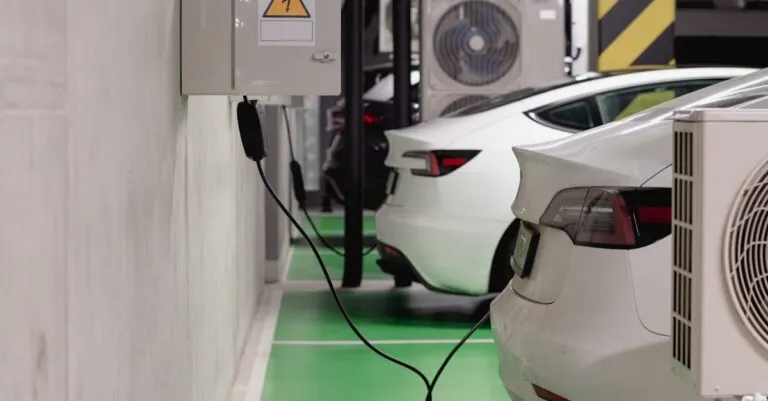Table of Contents
ToggleIn a world where gas prices seem to climb faster than a squirrel on espresso, hybrid cars are the cool kids on the block. They’re not just fuel-efficient; they’re the eco-friendly superheroes we didn’t know we needed. Imagine cruising down the highway, feeling like a green warrior while your wallet breathes a sigh of relief.
Hybrid cars combine the best of both worlds: the power of a traditional engine and the efficiency of electric technology. They’re like the Swiss Army knives of the automotive world—versatile, practical, and oh-so-stylish. As more drivers embrace this innovative technology, it’s clear that hybrids aren’t just a trend; they’re paving the way for a sustainable future. So buckle up and get ready to discover why these vehicles are turning heads and changing the game for drivers everywhere.
Overview Of Hybrid Cars
Hybrid cars combine traditional gasoline engines with electric power systems, offering a unique driving experience. These vehicles excel in fuel efficiency, making them a popular choice among eco-conscious drivers. Fuel economy in hybrids varies, often achieving 20 to 50% better mileage compared to conventional cars. Features such as regenerative braking harness energy during deceleration, enhancing battery performance and extending driving range.
Drivers appreciate the dual powertrain, which allows seamless transitions between electric and gasoline propulsion. Urban environments particularly benefit from hybrids, as electric power is more frequently utilized during stop-and-go traffic. Popular models include the Toyota Prius and Honda Insight, both leaders in the hybrid segment.
Resale values for hybrid cars tend to remain high due to ongoing consumer interest in sustainability. Technological advancements improve hybrid efficiency continuously, making these vehicles more appealing to a broader audience. Infrastructure for electric charging often complements hybrid usage, with many cities installing public charging stations.
Investors are increasingly focused on hybrid technology, recognizing the potential for innovation within the automotive industry. Manufacturers are responding by developing more hybrid variants, offering choices across various vehicle types from compact cars to SUVs. Markets are adapting as regulatory bodies push for greener transportation solutions, establishing hybrid cars as a fundamental component of the automotive landscape.
Types Of Hybrid Cars
Hybrid cars come in several types, each utilizing a different combination of gasoline engines and electric systems. Understanding these types helps drivers make informed decisions based on their needs.
Parallel Hybrid
Parallel hybrids use both gasoline engines and electric motors simultaneously to drive the wheels. This setup allows the vehicle to operate using either power source or both at once, optimizing fuel efficiency. The Toyota Prius exemplifies this design, delivering exceptional mileage. Power transitions occur seamlessly, providing a smooth driving experience. Regenerative braking also captures energy during braking, improving battery efficiency during city commutes.
Series Hybrid
Series hybrids operate differently, relying solely on an electric motor for propulsion while using a gasoline engine to generate electricity. This configuration ensures that the electric motor drives the wheels directly. The Chevrolet Volt serves as a prime example of a series hybrid, featuring an electric range before the gasoline engine engages. Emissions are significantly lower compared to traditional vehicles, making them an environmentally friendly option. They excel in urban settings, where electric power often predominates.
Plug-in Hybrid
Plug-in hybrids stand out with larger batteries that can charge from external power sources, enabling electric-only driving for shorter distances. Drivers can utilize both electric and gasoline power, providing flexibility based on their travel needs. The Ford Fusion Energi represents this type effectively, capable of traveling up to 25 miles on electric power alone. Charging at home or at public stations enhances convenience while reducing gasoline use. This capability makes plug-in hybrids a popular choice for those seeking to minimize emissions.
Benefits Of Hybrid Cars
Hybrid cars provide numerous advantages, particularly in fuel efficiency and environmental impact.
Fuel Efficiency
Fuel efficiency represents a significant benefit of hybrid cars. They achieve 20 to 50% better mileage compared to traditional vehicles. A combination of gasoline engines and electric motors optimizes energy use during driving. Regenerative braking recharges the battery, enhancing efficiency, especially in stop-and-go traffic. Toyota Prius exemplifies this technology, showcasing exceptional fuel economy. Many consumers notice lower fuel costs over time, contributing to overall savings. Driving a hybrid reduces the frequency of refueling, offering convenience and reliability for urban dwellers.
Environmental Impact
Hybrid cars contribute positively to reducing environmental impact. Lower emissions distinguish them from conventional gasoline-powered vehicles. Series hybrids, like the Chevrolet Volt, utilize electric motors, minimizing air pollutants significantly. Many hybrids produce less carbon dioxide, aligning with global efforts to combat climate change. Additionally, reliance on electric power diminishes the dependence on fossil fuels. With increased consumer interest in sustainability, brands invest heavily in hybrid technology. These vehicles support a cleaner future by promoting greener driving options.
Challenges Of Hybrid Cars
Hybrid cars present several challenges despite their popularity. Understanding these issues is crucial for potential buyers.
Cost And Affordability
High initial purchase prices often deter buyers from selecting hybrid models. Many hybrids cost 10 to 20% more than their traditional counterparts, with models like the Toyota Prius similarly reflecting this pricing structure. While these vehicles save money on fuel, the long-term financial benefits take time to offset the initial investment. Incentives such as tax credits and rebates can mitigate some costs, but not all customers are eligible. Financing options may also enhance affordability, allowing consumers to spread payments over time.
Maintenance Issues
Hybrid vehicles often entail unique maintenance requirements. Specialized knowledge is necessary for servicing hybrid systems, leading to potential increases in service costs. Battery replacement may pose another significant expense, especially after the warranty period. Typically, hybrid batteries can last 8 to 10 years, but replacement costs range from $1,000 to $6,000. Regular maintenance often includes additional inspections and checks, making it essential for owners to find qualified technicians. Overall, while hybrids provide advantages, addressing these maintenance concerns is vital for prospective buyers.
Future Of Hybrid Cars
Hybrid cars are set to dominate the automotive market as they evolve alongside technological advancements. By 2030, experts predict that hybrid vehicles will make up 30% of new car sales, driven by consumer demand for fuel efficiency and eco-conscious alternatives. Manufacturers are investing heavily in research and development, focusing on enhanced battery technology and improved electric motors.
Advancements in charging infrastructure support this growth. The expansion of fast charging stations makes owning plug-in hybrids more practical for everyday drivers. Cities and states are receiving increased government support to install charging networks, which further encourages hybrid adoption.
Environmental regulations are becoming stricter, and automotive companies are adjusting their strategies. For example, major automakers like Toyota and Honda are committing to releasing a broader range of hybrid models, ensuring a variety of options for consumers. This trend reinforces hybrids as a viable solution for reducing greenhouse gas emissions.
Consumer awareness continues to rise, with more individuals aware of the advantages of hybrid vehicles. Research shows that 70% of potential buyers consider fuel efficiency a priority when selecting a new car. This shift in consumer preference influences manufacturers to innovate, leading to more efficient engines and better overall performance.
Challenges regarding maintenance and battery replacement persist. A focus on improving service technology could reduce costs and streamline repairs. Additionally, the ongoing development of batteries promises to lengthen their lifespan, with new advancements potentially extending battery life beyond 10 years.
In essence, the future of hybrid cars looks promising. With continuous advancements, increased investment, and growing consumer interest, hybrids will play a crucial role in shaping a more sustainable and efficient automotive landscape.
Hybrid cars represent a significant shift in the automotive industry toward sustainability and efficiency. As technology advances and consumer awareness grows, these vehicles are becoming increasingly appealing. They offer a unique blend of performance and eco-friendliness that resonates with today’s drivers.
While challenges like initial costs and maintenance exist, the long-term benefits often outweigh these concerns. The ongoing investment in hybrid technology ensures a diverse range of options for consumers. With projections indicating a substantial market share by 2030, hybrids are not just a trend; they’re a cornerstone of a greener future. Embracing hybrid technology means embracing a smarter and more responsible way to drive.







